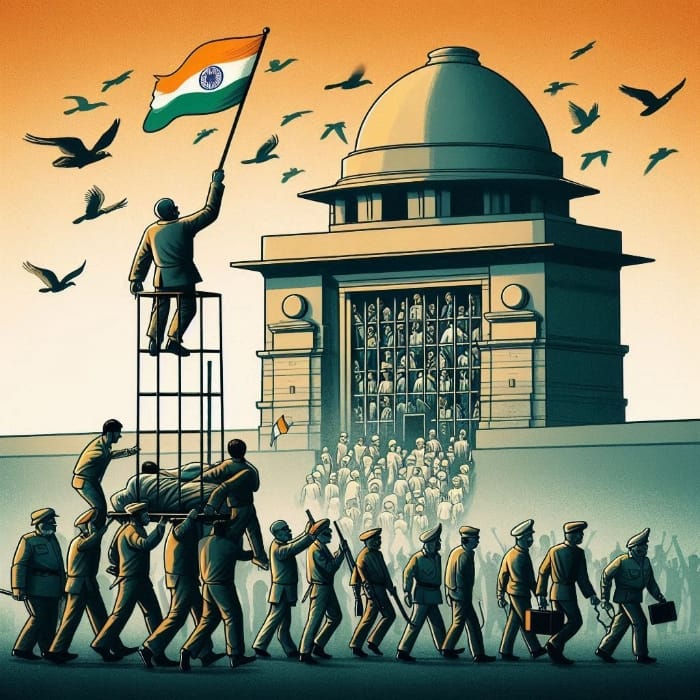Constitution Day Ushers Release of Undertrials Under New Criminal Law
By Manu Shrivastava
In a move that marks a monumental shift in the nation’s approach to criminal justice, the Ministry of Home Affairs (MHA) has instructed States and Union Territories to identify and facilitate the release of eligible undertrial prisoners on November 26, observed as ‘Constitution Day’ or ‘Samvidhan Divas.’
This unprecedented step, underpinned by the newly implemented Bharatiya Nagarik Suraksha Sanhita (BNSS), 2023, has the potential to reshape lives and deliver long-awaited justice to countless individuals languishing in India’s overcrowded prisons, awaiting trial.
 |
| Image for representational purpose only |
The directive is not merely a procedural update but a reflection of a deeper, more humane ethos, resonating with the values enshrined in India’s Constitution. Under Section 479 of the BNSS, individuals detained during investigations or trials can be released on bail if they have served up to one-half of the maximum sentence for their alleged offense, provided it’s not a grave crime like murder, rape, or terrorism — offenses that carry punishments of life imprisonment or death.
In an August 2024 order, the Supreme Court underscored this provision, encouraging prison superintendents nationwide to facilitate bail applications for undertrials meeting the eligibility criteria.
While the new provisions open doors for thousands of undertrials, the MHA’s directive clearly delineates boundaries to ensure that only minor, first-time offenders benefit. Those accused of heinous crimes under stringent laws like the Protection of Children from Sexual Offences Act (POCSO) or the Narcotic Drugs and Psychotropic Substances (NDPS) Act remain outside the ambit of this provision.
This fine balance reflects the government’s intention to prioritise judicial mercy without compromising public safety. By focusing on non-violent offenders who have no prior convictions, the BNSS ensures that individuals with a history of petty offenses are given a chance at freedom, while those accused of severe crimes face appropriate scrutiny.
This structured approach showcases a pragmatic blend of compassion and caution, symbolising a progressive step toward decongesting jails while preserving the integrity of India’s legal system.
The Constitution of India, adopted in 1949, is more than a legal document; it’s a manifesto of justice, equality, and fundamental rights for every citizen. Celebrating Constitution Day through the release of undertrials aligns the nation’s judicial goals with its founding values, underscoring the principle that justice delayed is indeed justice denied.
This initiative, which coincides with the Constitution Day celebrations, is designed to remind citizens of these values, translating lofty ideals into actionable reforms that impact real lives.
The MHA’s directive reinforces a key message: the Constitution protects even the most marginalised, ensuring that nobody is subjected to prolonged, undue punishment without due process. By releasing eligible undertrials, the government is renewing its commitment to uphold the principles of human dignity and fairness, especially for those trapped in the wheels of judicial delay.
The Supreme Court’s active involvement has been pivotal in propelling this initiative. Recognising the plight of undertrial prisoners, the Court’s August order laid the groundwork for swift action under Section 479 of the BNSS. This provision is applicable regardless of when the case was registered, extending relief even to those detained before the law came into force on July 1, 2024.
By mandating prison authorities to assist in bail applications for qualifying detainees, the Supreme Court is pushing for systemic changes that reflect the broader objective of justice reform.
This top-down approach, from the Supreme Court to state prisons, ensures consistency across the nation, setting a precedent for compassion-driven judicial processes. The Court’s intervention exemplifies how the judiciary, alongside the executive, can effectuate large-scale reforms to tackle long-standing issues such as overcrowded jails and delayed trials.
The MHA has outlined this initiative as part of a larger campaign, aiming to make Constitution Day a symbol of judicial relief for undertrial prisoners across the country. As States and Union Territories rally to meet the directive, the impact will reverberate far beyond the walls of prison cells. Families of detainees await this development with hope, anticipating the return of their loved ones who have served substantial portions of their sentences without trial.
In a society where procedural delays often fuel despair, this special campaign promises a new beginning for many. It is a potent reminder of the transformative power of justice and the enduring legacy of the Constitution, which safeguards rights irrespective of class, creed, or circumstance.
As India prepares to release these undertrial prisoners, the occasion will serve as a living testament to the nation’s progress toward a fairer, more inclusive legal system — one that values liberty, equality, and the pursuit of justice as sacred and non-negotiable.
As November 26 approaches, the release of undertrial prisoners on Constitution Day will symbolise not just freedom but also a commitment to the spirit of justice embedded within the Constitution. This initiative under the BNSS is more than a temporary solution; it’s a statement of intent — a call to modernise India’s justice system, to make it more responsive, more humane, and more reflective of the nation’s democratic ideals.
This article is generated as part of The Justice Project - A DraftCraft International Initiative to research, document, intervene, and trigger change in justice systems, Across India & Beyond Borders.


























